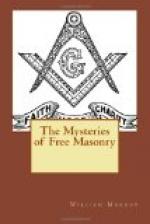The Master then asks the candidate, “What do you most desire?” The candidate answers after his prompter, “More light.” The bandage which was tied ’round his head in the preparation room is, by one of the brethren who stands behind him for that purpose, loosened and put over both eyes, and he is immediately brought to light in the same manner as in the preceding degree, except three stamps on the floor, and three claps of the hands are given in this degree. On being brought to light, the Master says to the candidate, “You first discover, as before, three great lights in Masonry, by the assistance of three lesser, with this difference, both points of the Compass are elevated above the Square, which denotes to you that you are about to receive all the light that can be conferred on you in a Mason’s Lodge.” The Master steps back from the candidate and says, “Brother, you now discover me as Master of this Lodge, approaching you from the East, under the sign and due-guard of a Master Mason.” The sign is given by raising both hands and arms to the elbows perpendicularly, one on either side of the head, the elbows forming a square. The words accompanying this sign in case of distress are, “O Lord, my God, is there no help for the widow’s son?” As the last words drop from your lips, you let your hands fall in that manner best calculated to indicate solemnity. King Solomon is said to have made this exclamation on the receipt of the information of the death of Hiram Abiff. Masons are all charged never to give the words except in the dark, when the sign cannot be seen. Here Masons differ very much; some contend that Solomon gave this sign, and made this exclamation when informed of Hiram’s death, and work accordingly in their Lodges. Others say the sign was given, and the exclamation made at the grave when Solomon went there to raise Hiram, and, of course, they work accordingly; that is to say, the Master who governs a Lodge holding the latter opinion, gives the sign, &c., at the grave, when he goes to raise the body, and vice versa. The due-guard is given by putting the right hand to the left side of the bowels, the hand open, with the thumb next to the belly, and drawing it across the belly and let it fall; this is done tolerably quick. After the Master has given the sign and due-guard, which does not take more than a minute, he says, “Brother, I now present you with my right hand in token of brotherly love and affection, and with it the pass-grip and word.” The pass-grip is given by pressing the thumb between the joints of the second and third




